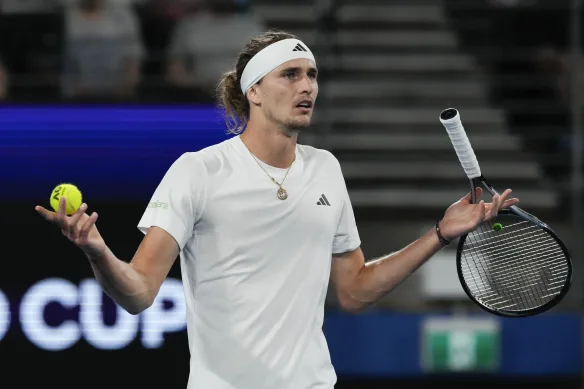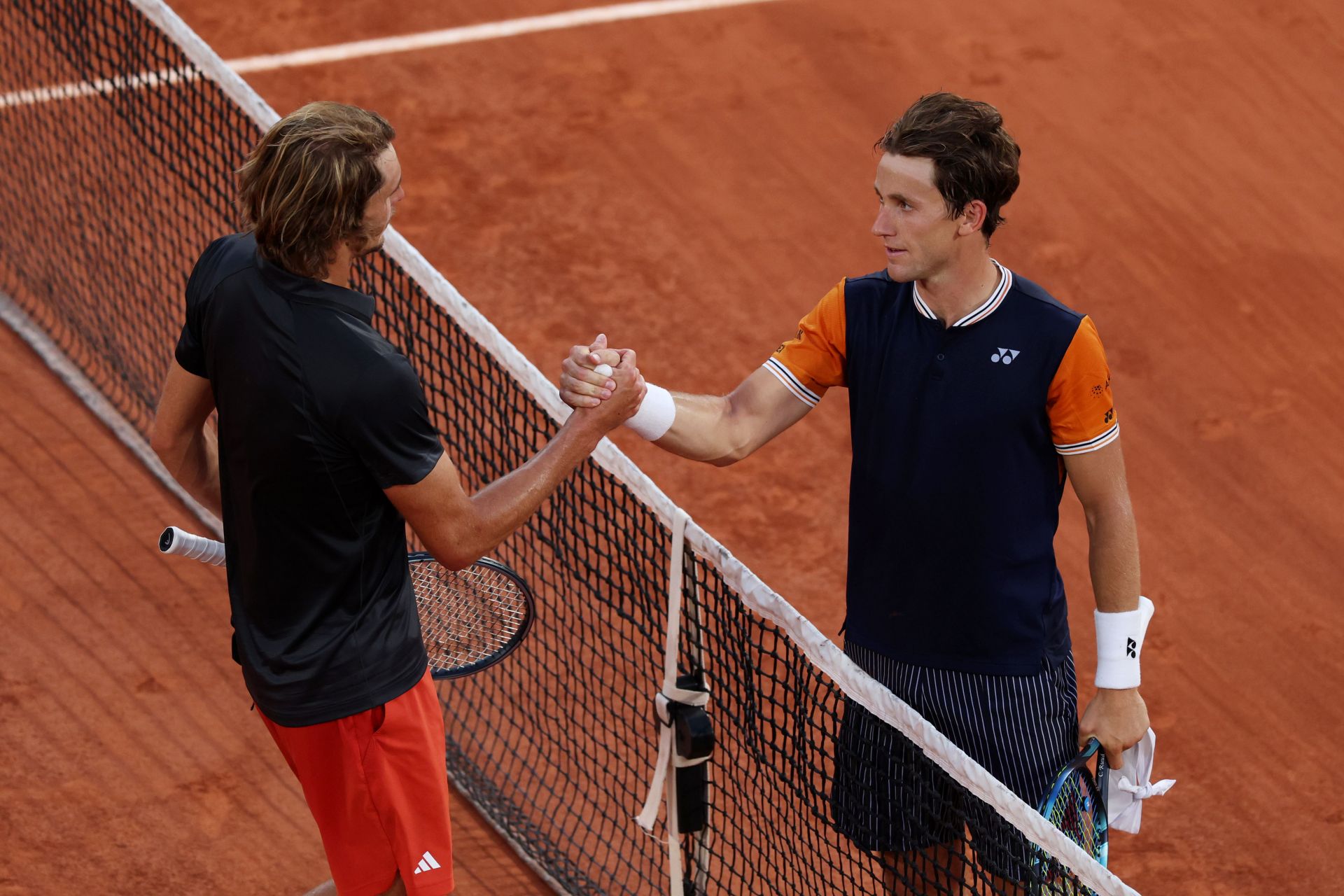Why Was Zverev's Match Suspended Today? Unpacking The Wimbledon 2025 Day One Drama
Day one at the 2025 Wimbledon Championships, you know, often brings with it a mix of thrilling tennis and, sometimes, a little bit of unexpected drama. Fans gathered, very much ready for some incredible action on the grass courts, but then, a rather sudden halt came for some key matches. This year, the focus quickly turned to why Alexander Zverev's highly anticipated match, among others, was brought to a stop, leaving many wondering what exactly happened and when play would pick back up. It’s a situation that, in a way, truly highlights the unique challenges and traditions of a major tournament like Wimbledon.
The suspension of Alexander Zverev's match on Centre Court, so, certainly caught a lot of people off guard. He's a top player, ranked number three, and his games are usually quite the draw. This particular pause occurred after just two sets, which, you know, makes it feel a bit more abrupt. It wasn't just his match, either; a few other contests also faced premature endings across various courts, adding to the day's surprising turn of events for players and fans alike.
This kind of interruption, actually, isn't entirely new to the world of tennis, especially at Wimbledon. The championships have, in some respects, a rather infamous rule that often dictates when play must cease. Understanding this rule, and how it impacts the schedule, can really help explain why Zverev's match, and others, couldn't continue into the late evening. It’s something that, you know, often sparks conversation among tennis enthusiasts.
Table of Contents
- The Infamous Wimbledon Curfew Explained
- Alexander Zverev's Match and the Curfew
- Other Matches Affected on Day One
- Rain Delays: A Different Kind of Suspension
- The Impact on Players and the Schedule
- Frequently Asked Questions About Match Suspensions
The Infamous Wimbledon Curfew Explained
One of the most talked-about rules at the Wimbledon Championships, you know, is the rather strict curfew. This particular rule, which applies to play at SW19, dictates that matches must stop by a certain time in the evening. It’s a tradition that, in a way, has been in place for a long time and is designed to manage the impact of late-night play on local residents and, perhaps, the overall flow of the tournament. The idea is to prevent matches from running too late into the night, which could cause disruptions for people living nearby.
The curfew, typically, means that even if a match is at a crucial point, play has to be suspended once the clock hits the designated hour. This can be, you know, a bit frustrating for players who might have momentum on their side, or for fans who are totally engrossed in a close contest. However, it’s a rule that, apparently, everyone involved understands and accepts as part of the unique character of Wimbledon. It just tends to be something everyone prepares for, especially on days with longer matches or earlier delays.
This rule, you know, is also a key reason why more match suspensions will likely come up as the tournament continues. If earlier matches run long, or if there are any other delays during the day, it just pushes the later matches closer to that curfew deadline. So, it's almost a given that we'll see more instances where matches are paused and carried over to the next day. It's a system that, basically, keeps things moving in a somewhat predictable fashion, even with unexpected stops.
Alexander Zverev's Match and the Curfew
Alexander Zverev's match on Centre Court, you know, was a prime example of the Wimbledon curfew in action on day one of the 2025 championships. His contest, which had reached two sets, was paused because of the SW19 curfew. This means that, even though the match was still going, the time limit for play had been reached, forcing an immediate stop. It's a situation that, actually, happens fairly often at Wimbledon, especially for matches scheduled later in the day.
The German player, who is, you know, ranked number three in the world, was right in the middle of his opening round. The suspension marks a significant moment for him and his opponent, as they now have to return to the court on a different day to finish what they started. This can, in some respects, affect a player's rhythm and preparation, as they have to warm up and get back into a competitive mindset after an unexpected break. It's a challenge that, you know, top athletes like Zverev are very used to handling.
It's worth noting that, in this specific instance, the suspension of Zverev's match was directly attributed to the curfew, not to other common reasons like bad weather. This distinction is, you know, pretty important because it highlights the unique impact of this particular Wimbledon rule. The match was simply too long for the day's allotted time, and so, it had to be put on hold until the next opportunity. You know, it's just how things sometimes go at this historic event.
Other Matches Affected on Day One
Beyond Alexander Zverev's match, you know, day one at the 2025 Wimbledon Championships saw a few other contests also facing premature endings due to the curfew. Taylor Fritz's first-round clash against Giovanni Mpetshi Perricard was, for example, another notable match that couldn't be completed. This meant that, like Zverev's, Fritz's match was suspended due to the SW19 curfew, adding to the list of unfinished business for the next day.
The fact that, you know, four other matches across various courts also faced premature endings on the opening day really shows how widespread the impact of the curfew can be. It's not just about the big names on the main courts; matches happening all over the grounds can be affected if they run too long or if the day's schedule gets pushed back. For players and fans alike, it's a bit of a mixed bag, as the excitement of day one can, you know, sometimes end a little abruptly.
These suspensions, you know, create a ripple effect on the tournament schedule. Matches that aren't finished on one day have to be slotted into the next day's lineup, which can then, in turn, delay other scheduled games. This is, basically, why Wimbledon sometimes has to cancel matches, as the text mentions 48 matches were canceled on a schedule. It's a constant balancing act for the organizers to keep everything moving, especially when these kinds of delays pop up, which they tend to do.
Rain Delays: A Different Kind of Suspension
While the Wimbledon curfew was the reason for Zverev's match suspension, it's worth remembering that, you know, rain is another very common cause for tennis matches to be paused. For instance, the text mentions that play was suspended due to rain at the Miami Open. This shows that, you know, weather can play a huge part in disrupting tennis tournaments all around the world, not just at Wimbledon. It's a totally different reason for stopping play, but with similar effects on the schedule.
The impact of rain can be, you know, pretty significant. Over two hours of rain disrupted a Tuesday's schedule, forcing organizers to reshuffle matches. This kind of weather delay can mean long waits for players and fans, and it can also lead to a lot of matches being postponed or even canceled entirely. Wimbledon, for example, has been forced to cancel a large number of matches on a day's schedule because of bad weather, leaving the schedule in tatters, which is a pretty big deal.
However, it's important to note the distinction here: for Zverev's specific match at Wimbledon, the reason given was the curfew, not rain. The text states, "While most games resumed, Zverev’s was the only singles match postponed to the," implying that other games might have been delayed by something else, but his was distinct. So, while rain is a frequent culprit for suspensions, it wasn't the cause for this particular high-profile pause, which is, you know, a key detail to grasp. You can learn more about how weather affects major tennis tournaments on our site.
The Impact on Players and the Schedule
When a match is suspended, you know, it has a pretty big effect on the players involved. Imagine being in the middle of a crucial match, perhaps at the Italian Open, as the text hints at an incident occurring during one. Then, suddenly, you have to stop. This can, in a way, really mess with a player's focus and momentum. They might have been playing really well, feeling good, and then they have to cool down, go home, and then try to recapture that same intensity the next day. It’s a mental challenge, for sure.
For someone like Alexander Zverev, who, you know, recently reached the Australian Open final after Novak, these kinds of interruptions can be particularly tricky. Top players, apparently, rely on consistency and rhythm during a tournament. A suspension means a break in that rhythm, and they have to adjust their entire routine for the next day, including warm-ups, meals, and mental preparation. It's a situation that, you know, requires a lot of adaptability from these athletes.
The tournament schedule itself, you know, also takes a hit. When matches are suspended, they have to be rescheduled, often for the following day. This can, in some respects, lead to players having to play back-to-back days, or even having less rest between matches if they have to finish a suspended game and then play another one. This year, the opening day of the 2025 Wimbledon Championships delivered everything fans could have wanted, but also these suspensions, which, you know, add a layer of logistical complexity for the organizers. You can find more information about the challenges of tournament scheduling here.
The difference in court conditions between day and night, as Alexander Zverev explains about the Canadian Open, can also be a factor when matches are moved. The court might play differently, which, you know, is something players have to consider when they resume. His match being paused, regardless of the reason, just highlights how unpredictable sports can be, and how, sometimes, external factors totally dictate the flow of play.
Frequently Asked Questions About Match Suspensions
Why does Wimbledon have a curfew?
Wimbledon has a curfew, you know, primarily to manage the impact of late-night play on the local community surrounding the All England Club. It's a tradition that, basically, ensures matches don't run too late into the evening, helping to reduce noise and disruption for residents. It's just a part of the unique character of the tournament, you know, something that has been in place for a long time.
How do match suspensions affect players?
Match suspensions can, in some respects, affect players by disrupting their momentum and mental focus. They have to stop playing, often in the middle of a crucial point, and then return the next day to finish. This means, you know, they need to adjust their warm-up routines, their rest, and their overall preparation, which can be a bit of a challenge. It's a test of their adaptability, really.
Is rain the only reason for tennis match suspensions?
No, rain is not the only reason for tennis match suspensions. While rain is, you know, a very common cause for play to be stopped, as seen at events like the Miami Open, other factors like the Wimbledon curfew can also lead to matches being paused. Sometimes, too, poor light or other unforeseen circumstances can cause a suspension. It's not just about the weather, you know, there are other rules in play.

Top seed Zverev departs under a cloud in Munich | The Canberra Times | Canberra, ACT

JUST IN: Alexander Zverev has been suspended from ATP

"Horrible shadow over French Open" - Alexander Zverev should've been suspended until domestic